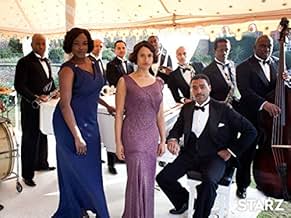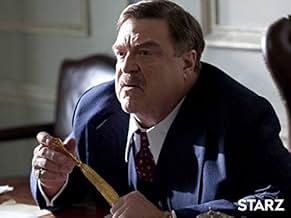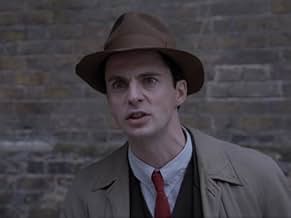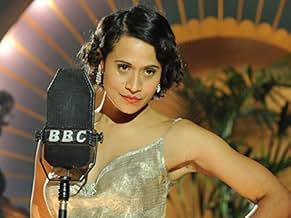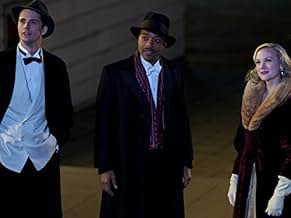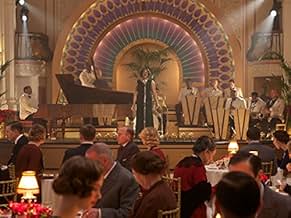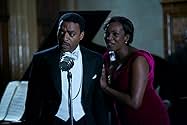IMDb-BEWERTUNG
7,4/10
2926
IHRE BEWERTUNG
Füge eine Handlung in deiner Sprache hinzuSet in the 1930s, a black Jazz band rises in fame and popularity while becoming entangled in an intricate web of intrigue, mystery and suspense with the elite of London society.Set in the 1930s, a black Jazz band rises in fame and popularity while becoming entangled in an intricate web of intrigue, mystery and suspense with the elite of London society.Set in the 1930s, a black Jazz band rises in fame and popularity while becoming entangled in an intricate web of intrigue, mystery and suspense with the elite of London society.
- Für 1 Primetime Emmy nominiert
- 5 Gewinne & 16 Nominierungen insgesamt
Folgen durchsuchen
Empfohlene Bewertungen
Firstly, at the time of writing (16 September 2013) the information for this on the main page is incorrect. It says this film/series is not yet released. However, I've just watched all 5 episodes on DVD (2 DVDs to be precise), plus the extra almost 1 hour "interview" between Stanley and Louis. The DVD release date was March 2013.
Like another reviewer I simply don't understand some of the poor ratings for this film. It was an immaculate production with an excellent cast for, I think, a cracking, well written story. It has style, suspense, humour, sensuality, good looks, great music and, as with so much of Stephen Poliakoff's work, a lot of intelligent dialogue and some fairly long scenes. But that's why I'm a fan of Poliakoff's work - it is literate, well researched and observed, and you have to pay attention. It rewards that attention many time over.
I must say there were some performances that were a revelation to me. Jacqueline Bisset for a start, and the late Mel Smith. But everyone was really outstanding in the parts they played. Joanna Vanderham is astonishingly mature well beyond her years (19 or 20 years old during the production) and is destined I feel to be a great actress. One cannot comment on this production without mentioning the singers - 2 established actresses who had never sung in public, in theatre, TV or on film before. They did their own singing and were amazingly good.
Like another reviewer I simply don't understand some of the poor ratings for this film. It was an immaculate production with an excellent cast for, I think, a cracking, well written story. It has style, suspense, humour, sensuality, good looks, great music and, as with so much of Stephen Poliakoff's work, a lot of intelligent dialogue and some fairly long scenes. But that's why I'm a fan of Poliakoff's work - it is literate, well researched and observed, and you have to pay attention. It rewards that attention many time over.
I must say there were some performances that were a revelation to me. Jacqueline Bisset for a start, and the late Mel Smith. But everyone was really outstanding in the parts they played. Joanna Vanderham is astonishingly mature well beyond her years (19 or 20 years old during the production) and is destined I feel to be a great actress. One cannot comment on this production without mentioning the singers - 2 established actresses who had never sung in public, in theatre, TV or on film before. They did their own singing and were amazingly good.
While this makes every effort to appear genuine to the period, it is a superficial experience. The realization comes in the third episode when Lady Cremone (Bisset) says of a party that it will be "fun". Anyone who has read Mitford or Waugh, and Gibbons in "Cold Comfort Farm", knows that 'fun' was a banished adjective among people of that class in that period. It's something that the writer ought to know.
And while the set design and costumes and overall production is glossy it's like a fashion shoot. That fact comes out in the lack of story and drama - nothing much happens and very slowly for a long time. It has a contrived and much smaller stamp to it. Certainly, it does not justify its time or structure. It might have been done much better in half the time.
The music which ought to be central is not and seems of a decade later; in arrangement, style and solo voicing, unconnected to the early 1930s, false when matched against recordings of that time.
As to the characters. They are standard TV fare, but only half-formed. They say things as ciphers in some mimicry of what real characters might have said in that period.
And while the set design and costumes and overall production is glossy it's like a fashion shoot. That fact comes out in the lack of story and drama - nothing much happens and very slowly for a long time. It has a contrived and much smaller stamp to it. Certainly, it does not justify its time or structure. It might have been done much better in half the time.
The music which ought to be central is not and seems of a decade later; in arrangement, style and solo voicing, unconnected to the early 1930s, false when matched against recordings of that time.
As to the characters. They are standard TV fare, but only half-formed. They say things as ciphers in some mimicry of what real characters might have said in that period.
No idea what to expect, but became totally hooked for these reasons: 1. Intelligent dialogue and storyline. A very well researched period piece dealing with both early 20th century British culture (a little American too); influence of music in culture (in this case mostly jazz); aristocracy relations with the poor (things never change); black (and other groups) relations with white power (money, politics, etc.). 2. Superb acting. 3. Superb period singing and accompanying music. 4. Most importantly for a quality film is attention to detail. 5. Suspenseful drama (Whodunit?). 6. Left room for a continuation which, unfortunately, doesn't appear to be in the works. 7. Interesting final episode of tidying up loose ends, even interviewing the dead as if they never died.
For so many people not liking this, it has a high rating here on IMDb. I enjoyed it but see its flaws.
I am not familiar with the work of Stephen Poliakoff, so I can't comment on the criticisms of him.
The series is about a black jazz band in the 1930s who is discovered by a music journalist, Stanley Mitchell (Matthew Goode). With Wesley's help, the group is booked at the upscale Imperial Hotel and even entertain Prince George (erroneously described during the program as the Prince of Wales, who was actually Edward, Prince of Wales).
The band becomes successful and is written up often by Mitchell. With two talented singers (Wunmi Mosaku and Angel Coulby), they come to the attention of a record company and radio. But tragedy strikes, and the ensuing events threaten to ruin the band.
I'm at a disadvantage here because I'm not familiar with early '30s jazz music, but the critiques say the music presented is actually from a decade later. The songs are original to the production, which were also criticized. The producers certainly could have found actual songs, but I suppose they didn't want to pay for the rights. A couple of the songs weren't very good.
It's an expensive production with some excellent actors: Goode, who I've always loved, Chiwetel Ejiofor as Louis Lester, the leader of the band, Anthony Head, John Goodman, Tom Hughes, and Jacqueline Bisset. Very formidable.
There was also criticism that the series did not really evoke the '30s. I thought it looked wonderful, particularly the hotel scenes. But I agree, there was something missing in the period feel.
Fascinating to me was the statement in the series that the Brits didn't know what Americans sounded like until the advent of talking pictures, as well as the talk of the wireless. One really does get the feeling of limited communication and how far we've come.
Suspenseful, well-acted, this could have been more fascinating with some stronger writing, attention to period details, and maybe some cutting, perhaps to four episodes instead of six.
The research wasn't perfect -besides the Prince of Wales ID, there was also the reference to Clark Gable. In 1933, Clark Gable was just coming onto the radar in the U. S. Ronald Colman would have been much better. The devil is in the details.
I am not familiar with the work of Stephen Poliakoff, so I can't comment on the criticisms of him.
The series is about a black jazz band in the 1930s who is discovered by a music journalist, Stanley Mitchell (Matthew Goode). With Wesley's help, the group is booked at the upscale Imperial Hotel and even entertain Prince George (erroneously described during the program as the Prince of Wales, who was actually Edward, Prince of Wales).
The band becomes successful and is written up often by Mitchell. With two talented singers (Wunmi Mosaku and Angel Coulby), they come to the attention of a record company and radio. But tragedy strikes, and the ensuing events threaten to ruin the band.
I'm at a disadvantage here because I'm not familiar with early '30s jazz music, but the critiques say the music presented is actually from a decade later. The songs are original to the production, which were also criticized. The producers certainly could have found actual songs, but I suppose they didn't want to pay for the rights. A couple of the songs weren't very good.
It's an expensive production with some excellent actors: Goode, who I've always loved, Chiwetel Ejiofor as Louis Lester, the leader of the band, Anthony Head, John Goodman, Tom Hughes, and Jacqueline Bisset. Very formidable.
There was also criticism that the series did not really evoke the '30s. I thought it looked wonderful, particularly the hotel scenes. But I agree, there was something missing in the period feel.
Fascinating to me was the statement in the series that the Brits didn't know what Americans sounded like until the advent of talking pictures, as well as the talk of the wireless. One really does get the feeling of limited communication and how far we've come.
Suspenseful, well-acted, this could have been more fascinating with some stronger writing, attention to period details, and maybe some cutting, perhaps to four episodes instead of six.
The research wasn't perfect -besides the Prince of Wales ID, there was also the reference to Clark Gable. In 1933, Clark Gable was just coming onto the radar in the U. S. Ronald Colman would have been much better. The devil is in the details.
Based on a hitherto undiscovered aspect of British history, DANCING ON THE EDGE tells of the fortunes of an African-Caribbean jazz band in 1930s upper-class British society. Louis Lester serves an apprenticeship in the United States, then takes London by storm with the help of talented singers Jessie and Carla. Initially managed by Wesley, who drives a hard bargain but manages to offend just about everyone, the band is eventually guided by white fixer Stanley, who just so happens to run one of London's leading music papers, a rival to the much better- known "Melody Maker." Poliakoff has a fascinating story to tell of a basically racist society that nonetheless embraces the Louis Lester jazz band, which provides the kind of music than no one has ever heard before. The band are so successful that they even attract the interest of the Prince of Wales (the future King Edward VIII). At the same time polite society has a seamy underbelly; if anyone dares to question the idea of white supremacy, then they are summarily dealt with. This rule applies to white and nonwhite people alike. The television series attracted mixed reviews on its premiere in February and March 2013; after having read Poliakoff's excellent screenplay, I am rather nonplussed as to why DANCING ON THE EDGE generated this kind of reaction.
Wusstest du schon
- WissenswertesJenna Coleman and Tom Hughes would go on to star together as Queen Victoria and Prince Albert in the ITV period drama Victoria (2016).
- PatzerThe musical style of Louis Lester's band, and especially the vocal styles of his singers and the sorts of songs they perform, are typical of the 1950's, not the 1930's.
- VerbindungenFeatured in The Wright Stuff: Folge #18.20 (2013)
Top-Auswahl
Melde dich zum Bewerten an und greife auf die Watchlist für personalisierte Empfehlungen zu.
- How many seasons does Dancing on the Edge have?Powered by Alexa
Details
- Erscheinungsdatum
- Herkunftsland
- Sprache
- Auch bekannt als
- 邊緣之舞
- Drehorte
- Severn Valley Railway, Shropshire, England, Vereinigtes Königreich(Folkestone and South Bromley stations)
- Produktionsfirmen
- Weitere beteiligte Unternehmen bei IMDbPro anzeigen
Zu dieser Seite beitragen
Bearbeitung vorschlagen oder fehlenden Inhalt hinzufügen




